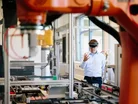BCG Global Survey: What is Factory of the Future?

The future of manufacturing is exciting. Digital transformation promises to offer a number of key advantages and adopting new technology is essential to maintaining cost competitiveness, delivering client services and attracting talent. With a plethora of technological innovation to choose from featuring robotics and automation, it has accelerated interest in the Factory of the Future. Manufacturing Global takes a closer look at the future of the industry.
What is Factory of the Future?
The Factory of the Future is a vision for how manufacturers should enhance production by making improvements in three dimensions: plant structure, plant digitisation and plant processes.
Plant Structure
In a Boston Consulting Group global survey of 750 production managers from leading companies in three sectors: automotive, engineered products and process industries, the majority of respondents expect plant structure to be important in the Factory of the Future. 86% of those surveyed anticipated plant structure to be vital in 2030, compared with 43% when surveyed.
- Multidirectional layout
- Modular line startup
- Sustainable production
Plant Digitisation
Manufacturers are increasingly using digital technologies. Of automotive respondents, 70% said that plant digitisation would be highly relevant in 2030, in comparison with 13% who think it is important when surveyed. Companies are achieving smarter automation and harnessing efficiency in several ways.
- Installing smart robots
- Using collaborative robots
- Implementing additive manufacturing
- Employing augmented reality
- Applying production simulations
- Developing immersive training sessions
- Implementing decentralised production steering
- Using Big Data and Analytics
Plant Processes
Through new digital technologies, manufacturers are taking lean management to the next level and exploiting its full potential. BCG’s survey shows that optimising plant processes is expected to be even more fundamental in the future, with 97% of automotive respondents acknowledging that lean management would be highly relevant in 2030, in comparison to 70% when surveyed. According to BCG, digital technologies are further enhancing customer-centricity and continuous improvement strategies.
Customer-centricity: Manufacturers are gaining a more complete understanding of customer needs by applying Big Data analytics to gather insights into how customers use products. In turn, companies are using these customer insights to improve their product designs and production processes. Companies are also aiming to use new technologies to allow customers to provide input regarding the production of their vehicle. For example, Daimler’s customers are able to request last-minute modifications, such as a change to a vehicle’s colour while en-route to the paint shop.
Continuous Improvement: Manufacturers are leveraging a range of new technologies to provide more value-adding activities and to continuously improve production processes. Bosch has introduced software that analyses data about its production of fuel injectors in real-time. The software monitors process adherence and recognises trends. This automatically transmits information about deviations to operators, enabling them to improve the process as a result.
Interested in reading more? Check out BCG’s article “The Factory of the Future.”

